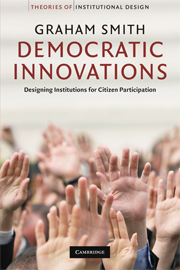Book contents
- Frontmatter
- Contents
- Acknowledgments
- Introduction
- 1 Studying democratic innovations: an analytical framework
- 2 Popular assemblies: from New England town meetings to participatory budgeting
- 3 Mini-publics: assemblies by random selection
- 4 Direct legislation: direct democracy through the ballot box
- 5 E-democracy: the promise of information and communication technology
- 6 Realising the goods of democratic institutions
- Conclusion
- References
- Index
6 - Realising the goods of democratic institutions
Published online by Cambridge University Press: 19 January 2010
- Frontmatter
- Contents
- Acknowledgments
- Introduction
- 1 Studying democratic innovations: an analytical framework
- 2 Popular assemblies: from New England town meetings to participatory budgeting
- 3 Mini-publics: assemblies by random selection
- 4 Direct legislation: direct democracy through the ballot box
- 5 E-democracy: the promise of information and communication technology
- 6 Realising the goods of democratic institutions
- Conclusion
- References
- Index
Summary
Having analysed an array of democratic innovations, we are in a far better position to discern the extent to which citizen participation in political decision-making can be institutionalised effectively. This chapter aims to draw out lessons learnt from the analysis of specific innovations in order to gain an understanding of the relationship between institutional design and the realisation of goods of democratic institutions. Initially we will compare and contrast the manner in which different design characteristics affect the realisation of each of the six goods that make up our analytical framework, namely inclusiveness, popular control, considered judgement, transparency, efficiency and transferability. This is a useful comparative exercise that provides evidence that many of the challenges laid down by sceptics and critics of citizen participation can be met if careful attention is given to institutional design. The analysis is limited, however, in the sense that it focuses only on the realisation of each good in isolation. Thus, the second part of the chapter will analyse the degree to which the legitimacy of each democratic innovation rests – at least in part – on the way in which it realises a compelling combination of goods. It would be unrealistic to expect any single design to fully realise all six goods in our analytical framework. Each innovation (or type of innovation) realises and prioritises these goods in different ways: legitimacy is tied to these different relative weightings.
- Type
- Chapter
- Information
- Democratic InnovationsDesigning Institutions for Citizen Participation, pp. 162 - 193Publisher: Cambridge University PressPrint publication year: 2009

